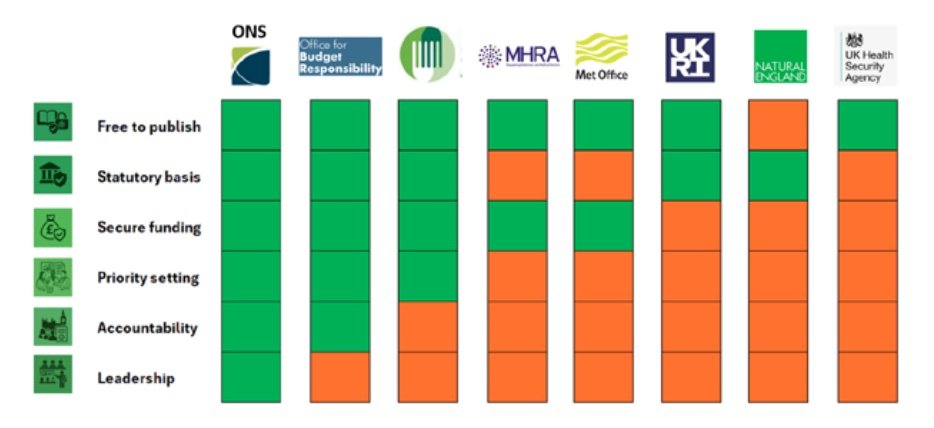
Strengthening The Institutions We Rely On
by Helen Johnston for Yorkshire Bylines
A new report finds that the UK’s arm’s length public bodies are highly vulnerable to politicisation.
Earlier this month, we reported on a talk by Professor Christina Pagel of University College London (UCL) at a Grassroots for Europe webinar about the Trump Action Tracker project, documenting the systematic dismantling of democratic institutions in the United States by the Trump regime.
Now, a new report, ‘Strengthening the institutions we rely on’ by Pagel and her colleagues Luke Flynn and Martin McKee at the UCL Policy Lab and the London School of Hygiene and Tropical Medicine (LSHTM) respectively, finds that the UK’s top scientific institutions, from the Met Office to the UK Health Security Agency, have inadequate institutional defences to prevent potential political interference.
Learning from the US experience
The tracker shows that under Donald Trump, independent institutions in the US have been systematically attacked in a number of clear areas:
With its populist, far right, nationalist agenda, the Reform Party is on the rise. We can see only too clearly how Nigel Farage is reading, and following, the Trump playbook. Professor Pagel explained that, as she watched events unfold in the States, she began to wonder: “What can we do that is a bit more positive than just tracking this kind of doom spiral. Do we need to protect British institutions if a right-wing populist government came into power here in four years’ time?” Her ANCHOR (Advancing National Commitment to Health and Science, Open Data & Resilient Oversight) project examines how UK institutions can be protected by understanding the US experience.
Identifying weak points
By mapping the independence of 24 arms-length bodies (ALBs), specifically involved in producing or publishing evidence or holding governments to account, the project aims to identify and counter potential vulnerabilities. Results for eight key bodies are shown below (taken from the Report’s executive summary).
Reassuringly, they show that the Office for National Statistics (ONS) is already substantially protected from interference. But some other vital bodies have very little independence. The UK Health Security Agency has the right to publish without interference, but it could be abolished rapidly, with no parliamentary oversight. This is effectively what the Tories did to its predecessor, Public Health England, in the middle of the pandemic.
The most vulnerable aspect across all the ALBs studied is that of independent appointments. The 2015 Grimstone Review significantly weakened the powers of the Commissioner for Public Appointments. Independent panels draw up a shortlist of candidates, but the new rules allow ministers to override their recommendations and pick whoever they want:
“Given what’s happened in the US, I think we can all see where that can go wrong.”
There is already evidence of interference in the independent functioning of some key bodies. While acknowledging the limitations of the UK’s parliamentary sovereignty, Pagel believes strengthening public accountability mechanisms can at least ensure parliamentary and public scrutiny of proposed changes to remit, funding or leadership, and so slow or prevent potential authoritarian shifts. “There is obviously a democratic argument that ministers should set overall strategy, but within that, ALBs should have the ability to set priorities on how to meet that strategy.”
How populists exploit vulnerabilities
The UCL Policy Lab report published today examines how the resilience of these key bodies can be strengthened to protect them from a populist government. According to Pagel: “We only need to look across the pond to the actions of the second Trump administration in the USA to see how a coordinated attack on institutional guardrails can rapidly undermine the independence of federal agencies and diminish evidence-based governance. This was not done through sweeping, time-consuming legal reform, but through the calculated exploitation of a series of structural vulnerabilities.
“We’ve seen how the replacement of agency leadership, purges of internal watchdogs and legal re-engineering have been weaponised in the USA, not to mention the slashing of funding and the suppression of research, and it is vital the UK learns lessons from this before it is too late.”
The report highlights how around one-third of the independent bodies studied lack statutory status, meaning their existence, powers and functions are not defined and authorised by an Act of Parliament, leaving them at risk of being redefined or even abolished behind closed doors.
Co-author Professor Martin McKee (LSHTM) says: “We compare the current situation to a castle with open gates and holes in its walls. This may not matter when there is peace but, when a threat arises, these weaknesses really matter.”
The report recommends:
- Increasing legal and statutory protection – Parliament should expand statutory underpinning where needed, especially for ALBs involved in regulation, scrutiny, or advice. It should protect against ministerial overreach.
- Supporting independence in leadership – The Civil Service should adopt appointment procedures that limit the direct involvement of ministers beyond setting the strategic direction of a post.
- Resilient funding models – Sponsoring departments should safeguard medium-term funding by expanding multi-year funding settlements to support sustainability and delivery and build on experience with existing practice.
- Strengthening accountability – Parliament should strengthen accountability by requiring ALBs to produce parliamentary accountability reports, which the National Audit Office would review.
- Setting priorities and safeguarding operational autonomy – Priority setting must reflect a balance between democratic oversight, the public interest and institutional independence.
- Protecting the freedom to publish – Legislation should protect the right of ALBs involved in scrutiny, regulation, or public health to publish independently, without needing the prior consent of ministers.
- Framing the national conversation – Ministers should publicly support the ALBs for which they are responsible and avoid using pejorative language or creating politically motivated bodies.
There is broad public agreement for these principles: polling for the report, carried out by More in Common, found 71% of Britons said it is more important for ALBs to be independent of the government, rather than controlled by it. Across all demographics, the public agreed that a key argument in favour of independent ALBs is that “politicians aren’t experts in many areas”.
Fighting back
The other participants in the webinar where Pagel introduced the ANCHOR project wholeheartedly endorsed the ideas behind it. Tom Brake of Unlock Democracy noted that, in opposition, Labour was very much in favour of restoring, for example, the independence of the Electoral Commission. Now it is in power, it prefers to leave the Tory changes on the statute book. “There are many examples of things that the government could be doing now to try to defend defenders better, should there be a change of government to one which seeks to do exactly the sort of things that Trump is doing in the US.”
Mike Galsworthy, chair of European Movement UK, agreed: “More democracy needs to happen in terms of empowering citizens’ voices, so that citizens can comment on, organise on, and resist power structures in politics … I think ANCHOR is a fantastic start to buttress the system”.
Original article by Helen Johnson for Yorkshire Bylines: https://yorkshirebylines.co.uk/politics/strengthening-the-institutions-we-rely-on/
Helen Johnston is a freelance translator who has lived in Spain for over two decades. She is on the council of the Bremain in Spain, and is the ‘Europe outside the UK’ member of the Grassroots for Europe Council.















